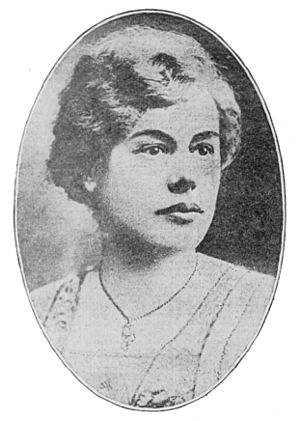Helen Dean King facts for kids
Quick facts for kids
Helen Dean King
|
|
|---|---|
 |
|
| Born | September 27, 1869 Owego, New York
|
| Died | March 7, 1955 Philadelphia, Pennsylvania
|
| Nationality | American |
| Alma mater | Vassar College Bryn Mawr College |
| Occupation | Biologist |
Helen Dean King (September 27, 1869 – March 7, 1955) was an American biologist. She was involved in breeding the Wistar lab rat, a strain of rats genetically homogeneous albinos intended for use in biological and medical research.
Contents
Life and work
Born at Owego, New York, she graduated from Vassar College in 1892, and in 1899 she received her doctorate in philosophy from Bryn Mawr College, with a thesis supervised by embryologist and geneticist Thomas Hunt Morgan. She had majored in morphology. She remained at the College after graduation as a fellow and student assistant in biology from 1897 to 1904.
King taught physiology at Miss Baldwin's School, Bryn Mawr, from 1899 to 1907, was research fellow at the University of Pennsylvania in 1906–08, and served as an assistant in anatomy in 1908-09. After 1909, she worked at the Wistar Institute, for more than 40 years, first as an assistant and eventually becoming professor of embryology in 1927 and remaining there until her retirement in 1949.
She was also an assistant at Woods Hole, Massachusetts. Her investigations dealt largely with problems of sex determination.
King served as vice president of the American Society of Zoologists in 1937, and was associate editor of the Journal of Morphology and Physiology from 1924 to 1927 and editor of the Wistar Institute's bibliography service from 1922 to 1935.
King participated in breeding the Wistar rat, a strain of genetically homogeneous albino rats for use in biological and medical research.
She died at age 85 on March 7, 1955 in Philadelphia, Pennsylvania.
Research
King's scientific research largely focused on studies of inbred rats, and she was particularly interested in human issues while using for this purpose data from meticulous experiments on laboratory rats. Through inbreeding, her rats were almost homozygous to each other, which facilitated research. In later years, she moved her focus to pursue research on gray Norway rats.
Awards
- Ellen Richards Research Prize of the Association to Aid Scientific Research for Women (1932)
See also
 In Spanish: Helen Dean King para niños
In Spanish: Helen Dean King para niños


